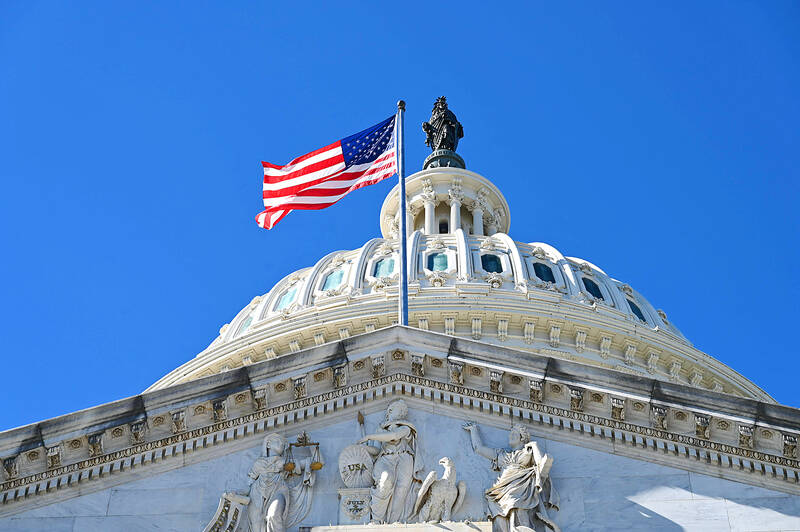Two US representatives on Thursday reintroduced a resolution calling for the US to end its “one China” policy, resume formal diplomatic ties with Taiwan and negotiate a bilateral Taiwan-US free trade agreement.
Republican US representatives Tom Tiffany of Wisconsin’s 7th Congressional District and Scott Perry of Pennsylvania’s 10th District were backed by 22 Republican members of the US House of Representatives.
The two congressmen first introduced the resolution together in 2021.

Photo: Daniel Slim, AFP
The resolution called on US President Donald Trump to “abandon the antiquated ‘one China’ policy in favor of a policy that recognizes the objective reality that Taiwan is an independent country, not governed by or included within the territory of the People’s Republic of China.”
Trump should also recognize the legitimacy of Taiwan’s democratically elected national government, appoint an official US ambassador to the nation and accept a Taiwanese counterpart in the US, it says.
The resolution also called on the US representative to the UN and other officials to advocate for Taiwan’s membership in the UN and other international bodies of which the US is a member.
The resolution went on to commend Taiwan for its “commitment to democracy, civil liberties and human rights.” It also referenced several former US presidents, including Jimmy Carter, Ronald Reagan and Bill Clinton.
Taiwan and the US had maintained normal diplomatic relations until “president Carter abruptly abandoned both without the approval of Congress in 1979” and that despite Reagan strengthening ties, “The United States has not altered its position regarding sovereignty over Taiwan,” the resolution says.
Clinton was also quoted in the resolution as having previously declared “that the issues between Beijing and Taiwan must be resolved peacefully and with the assent of the people of Taiwan.”
Both Republican lawmakers have a history of calling for stronger ties with Taiwan. The pair in 2021 recommended that the US support Taiwan’s bid for UN membership.
The US government switched diplomatic recognition from Taipei to Beijing in 1979 and has since maintained only unofficial diplomatic relations with Taiwan, as defined by the Taiwan Relations Act.
According to the bill, the “one China” policy is obsolete, does not serve the people of Taiwan or the US and fails to reflect the reality that Taiwan has been a sovereign and independent country for more than 70 years.
If the bill passes the House and the Senate, it would only be a “sense of Congress” resolution. It would not require the US president’s approval and would not have the full force of law.

A drunk woman was sexually assaulted inside a crowded concourse of Taipei Railway Station on Thursday last week before a foreign tourist notified police, leading to calls for better education on bystander intervention and review of security infrastructure. The man, surnamed Chiu (邱), was taken into custody on charges of sexual assault, taking advantage of the woman’s condition and public indecency. Police discovered that Chiu was a fugitive with prior convictions for vehicle theft. He has been taken into custody and is to complete his unserved six-month sentence, police said. On Thursday last week, Chiu was seen wearing a white

EVA Airways, one of the leading international carriers in Taiwan, yesterday said that it was investigating reports that a cabin crew manager had ignored the condition of a sick flight attendant, who died on Saturday. The airline made the statement in response to a post circulating on social media that said that the flight attendant on an outbound flight was feeling sick and notified the cabin crew manager. Although the flight attendant grew increasingly ill on the return flight, the manager did not contact Medlink — a system that connects the aircraft to doctors on the ground for treatment advice during medical

The Taoyuan Flight Attendants’ Union yesterday vowed to protest at the EVA Air Marathon on Sunday next week should EVA Airway Corp’s management continue to ignore the union’s petition to change rules on employees’ leave of absence system, after a flight attendant reportedly died after working on a long-haul flight while ill. The case has generated public discussion over whether taking personal or sick leave should affect a worker’s performance review. Several union members yesterday protested at the Legislative Yuan, holding white flowers and placards, while shouting: “Life is priceless; requesting leave is not a crime.” “The union is scheduled to meet with

‘UNITED FRONT’ RHETORIC: China’s TAO also plans to hold weekly, instead of biweekly, news conferences because it wants to control the cross-strait discourse, an expert said China’s plan to expand its single-entry visa-on-arrival service to Taiwanese would be of limited interest to Taiwanese and is a feeble attempt by Chinese administrators to demonstrate that they are doing something, the Mainland Affairs Council said yesterday. China’s Taiwan Affairs Office (TAO) spokesman Chen Binhua (陳斌華) said the program aims to facilitate travel to China for Taiwanese compatriots, regardless of whether they are arriving via direct flights or are entering mainland China through Hong Kong, Macau or other countries, and they would be able to apply for a single-entry visa-on-arrival at all eligible entry points in China. The policy aims